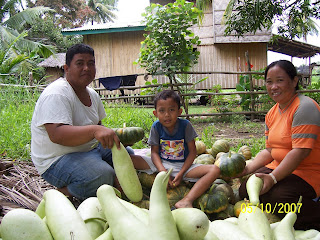
“You can’t shake hands with a clenched fist,” said Indira Gandhi. Datu Blah M. Diocolano, 64, a.k.a Kumander Tigre, formerly a Moro National Liberation Front (MNLF) commander, has opened his and shook hands with the government when he surrendered in 1992.
Datu Blah entered the MNLF group in 1970. “Noon hindi ka makapaghanapbuhay, tago ka ng tago,” he recalled. In addition, Datu Blah got shot in his leg that’s why he’s having difficulty walking now.
In 2006, Datu Blah accepted the challenge to be the Palayamanan cooperator in the Technical Cooperation Project (TCP) 4 by JICA, PhilRice, and DAF-ARMM in Margues, Datu Odin Sinsuat in Maguindanao. Now that the project has ended, Datu Blah proudly showed the accomplishments of the project in their site. He said that most of the participants gave their full support to the project eventhough it meant walking long distances just to get to the Farmers’ Field School (FFS) site. Furthermore, when they were already doing the FFS, many still wanted to join. They were asking “San kayo nag-apply para makasali diyan?,” said Datu Blah. This was confirmed by Datu Ali Naway Sumlay, agricultural promotions officer in the area saying that the group had always been enthusiastic and had 90-100% attendance during FFS.
There had been a lot of changes in Margues because of TCP 4. Before most of them cut trees and sold them to the market as firewood. The job, of course, was not enough to cover their daily expenses. When TCP 4 came, they learned how to plant vegetables as eggplant, tomatoes, okra, and many others. Datu Blah said this has made the difference in their lives as most houses started to do backyard gardening. Everybody became interested in planting vegetables since then!
“Yung mga tuyong dahon ilagay sa halaman (mulching), paggapas ng damo” said Datu Blah are the most adopted technologies. Other technologies that they learned include trellising, proper distance in planting, and fertilizer application. Before, Sumlay said farmers used a handful of fertilizer per hill which is very costly. Now, fertilizer application is reduced to one tablespoon per hill. They also learned how to use punching stick in fertilizer application. All of the participants, he added, have planted and applied the lessons from the FFS. In fact, Datu Blah bragged that Manny Pasawilan, one of the participants, has managed to harvest 34 sacks of upo (as of this writing) which he sells in Cotabato City Public Market at PhP 250.00/sack. Other farmers intend to follow this achievement while some are happy that they have enough for their own consumption.
Moreover, Datu Blah said that activities like this help promote peace. “Kung may tinatanim ka, meron ka ng pera. Pag meron ka ng pera, di ka na makaisip na gumawa ng kung anu-ano,” he explained. Datu Blah believes that poverty is the root cause of the insurgency problem. Thus, access to farming information will enable them to cope with poverty as they will have something to eat plus the opportunity to market their produce later on.
As an MNLF returnee, Datu Blah was a recipient of the government amnesty program. During his time, there were 12 of them who surrendered. They formed themselves into a cooperative since it’s a requisite before they could avail of the program. They then received P300, 000.00 which they used to buy a hand tractor. But then, what they thought would be something that would bring a twist to their lives eventually failed. The hand tractor was sold. Hence, the cooperative failed.
Datu Blah said he finds TCP 4 to be a sustainable initiative as it equipped them with the technical know-how so they could do it on their own once the project is over. In the former assistance, “basta binigay lang yung pera, walang technical support,” Datu Blah said. Margues residents said that the agricultural technicians and facilitators of the TCP 4 taught them many things which is the main reason why many got enticed to plant vegetables, something not true before TCP 4 came.
PhilRice and JICA have always emphasized that there should be project ownership in all their undertakings. Margues participants have been spreading what they have learned to other interested residents. After the vegetable farming, the group will undergo training on new techniques in lowland rice farming.
Meanwhile, Datu Blah said “Alagaan namin tong project na ito dahil malaki talaga ang maitulong nito sa amin.”

